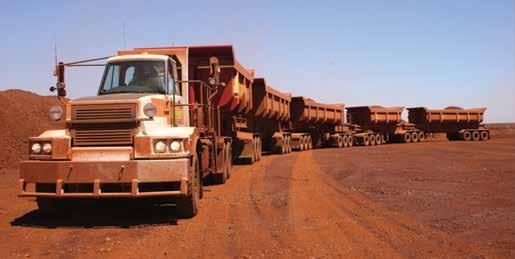
3 minute read
Landmark $255 Million Pilbara Urea Project
Transport a major advantage in mine haulage.
By 2006, Jim and Dave Jones from Hampton Transport Services realised that both companies’ livestock divisions were servicing the same routes with similar fleets and it made sense to amalgamate. Jim sold the RTA section of Gulf Transport to the Jones family to create Road Trains of Australia in its current form.
Advertisement
Running a transport business takes its toll on leisure and family time. Gulf Transport was certainly a family business involving both Jim, wife Jenny and son Jamie, but after years of never-ending commitment the family decided it was time for a break and the company was sold to BIS industries in 2010. At the time Jim said the toughest part of the decision, “was leaving 600 people behind, many of whom I’ve had a lifetime of involvement with.”
‘It’s the people who give a company character and make it happen and the Gulf Group was a good example of this.’
Jim later returned to his native New Zealand and became the owner of Devon Dairy Farm. Again his entrepreneurial flair stood him in good stead as he steered expansion of the operation to milk 4000 cows and be lauded as one of the best dairy farms in New Zealand. Transport innovation was never far from Jim’s mind and he developed modified milk trailers to enable back-loading of feed.
Whilst Jim Cooper’s business activities are well documented his influence on the transport industry from a policy perspective has also been significant. He felt strongly that the industry should have a collective voice. He was the inaugural president of the Northern Territory Road Transport Association and served on the ATA board and council. The ATA honoured him with the National Award for Outstanding Contribution to the Australian Trucking Industry in 1999. In 2008 he was awarded the Order of Australia Medal for his service to the transport industry.
Always concerned about the impact of excessive regulation on transport companies, Jim was concerned about the tendency for decisions to be made in NSW, Victoria and Canberra that impacted remote transport without any thought for the consequences.
He was instrumental in establishing the Remote Areas Group which still meets biannually to discuss and promote specific policies for remote transport. According to Frank Marley, from Marley’s Transport, Jim was full of energy for the industry and was often frustrated by regulation. He apparently remarked when discussing forming the Remote Areas Group that ‘Paramatta Road was never going to be replicated in Darwin.’ This comment has become something of a catch cry in rural transport circles.
The National Transport Museum is another legacy of Jim’s who together with other transport representatives, including WA’s Frank Marley and Lew Couper, lobbied for space to house historic collections of vehicles eventually being given a hangar in the Alice Springs airport. The museum later became the National Transport Hall of Fame with Jim being inducted in 2003.
Jim Cooper leaves four children behind – Robyne, Jamie, Erynne and Allison and many grandchildren. His wife Jenny passed in 2014.
He also leaves behind a lasting legacy in outback trucking with his name forever being synonymous with innovation, pushing the boundaries and questioning excessive and unnecessary regulation.
Image: Cummins Commentary.wordpress.com
The remarkable 1,520 HP Pit Hauler is powered by twin 760 HP Cummins QSK19 engines
of conditions, including the project reaching financial close and all statutory and regulatory approvals being met.
WA State Development, Jobs and Trade Minister Roger Cook said, "Recent international supply chain issues have highlighted just how important urea is to industry sectors such as agriculture and transport. "Western Australia has the potential to supply these sectors with the urea they need. "As the first new gas manufacturing project in the Pilbara for more than a decade, the Perdaman Urea Project will play a role in helping diversify Western Australia's economy and create local jobs."
Transport and Ports Minister Rita Saffioti said, "The development of a new multi-user wharf at the Port of Dampier will maximise the use of this important piece of infrastructure by facilitating the Perdaman Urea Project, as well as accommodating bulk carriers, cruise ships, and general cargo vessels. "This investment in the new wharf will also encourage trade diversification by opening up access to worldwide markets for urea from the Perdaman Project."









